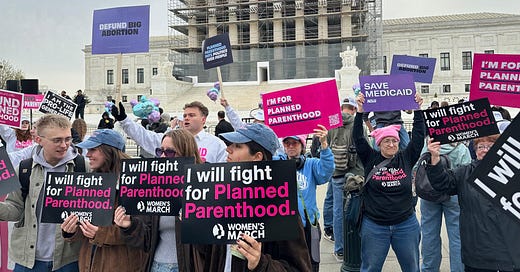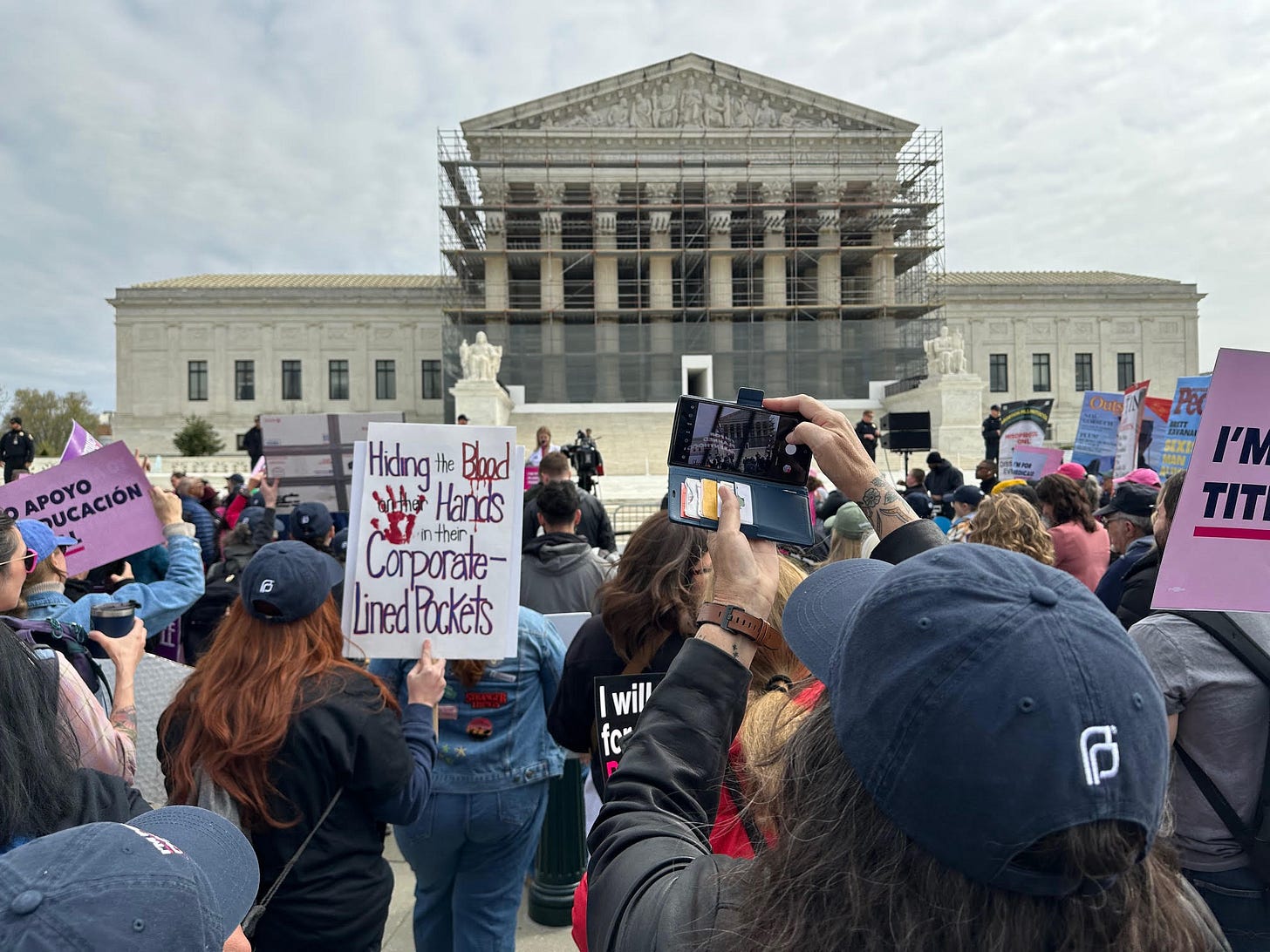Justices skeptical of S.C.'s efforts to stop suit over Planned Parenthood exclusion
A "magic words" misstep by Justice Kavanaugh in a case over Medicaid providers.
The U.S. Supreme Court heard arguments on Wednesday over South Carolina’s effort to exclude Planned Parenthood from its Medicaid program because the state’s Republican leaders don’t like the abortion health care that the organization provides.
That is not in dispute.
The question is whether federal law allows an individual receiving their insurance through Medicaid to sue over that decision.
After a little more than 90 minutes of arguments, it appeared that Planned Parenthood had the upper hand. Of the Republican appointees — two of whom would have to join the Democratic appointees to create a majority — Chief Justice John Roberts and Justices Amy Coney Barrett and Neil Gorsuch asked questions skeptical of South Carolina’s arguments against the right to sue here.
The case is over a provision in the Medicaid law. Planned Parenthood’s lawyers summed up the “any qualified provider” provision as such: It “states that ‘any individual eligible for medical assistance’ ‘may obtain such assistance from any institution’ that is ‘qualified to perform the service or services required’ and ‘undertakes to provide him such services.’ 42 U.S.C. 1396a(a)(23)(A).”
The question before the justices is whether that provision creates a right for a Medicaid beneficiary to choose a specific provider — and, as such, sue under Section 1983 (the federal provision authorizing private lawsuits for violations of rights) if the state refuses them that choice.
Alliance Defending Freedom, a far-right Christian legal advocacy organization, is representing South Carolina in the litigation, and ADF’s John Bursch went first on Wednesday, representing the state before the justices.
Despite the protesters in front of the court who made clear the focus of the argument, the first time “abortion” was mentioned at all Wednesday was near the end of Bursch’s argument time.
“The state decides who the providers are who are qualified and you get to choose among them,” he told the court. “And they decided that Planned Parenthood was unqualified for many reasons, chiefly because they're the nation's largest abortion provider.” This is so despite the fact that federal law already bans any Medicaid funding going to abortions.
Bursch’s argument is that the “any qualified provider“ provision doesn’t create a right — and, hence, no ability to sue — because it lacks “explicit rights-creating language.“
After some discussion of whether the language creates a right or a benefit, Justice Elena Kagan responded, telling Bursch, “I don't even know how to say this … without saying ‘right’ — has a right to choose their doctor. That's what this provision is. It's impossible to even say the thing without using the word ‘right.’ Has a benefit to choose their doctor?”
The “may obtain” language, Bursch insisted, “is not clear rights-creating language.“
Later, however, when Nicole Saharsky, a partner from Mayer Brown, got up representing Planned Parenthood South Atlantic, she returned to that. “[T]his idea that ‘may’ is like too wimpy of language, I just don't think is a good line to draw,“ she said, discussing that “‘may’ is used in a lot of contexts to reflect a protected choice or a right.”
For example, she noted, “judicial review provisions,” including of Federal Trade Commission orders or Security and Trade Commission orders “that say any person may obtain judicial review of such order by filing in a court of appeals.” In other words, although “may” is discretionary language, it can be read to create a right when it places the discretion — the “may” — in the hands of the individual.
As Kagan said at one point when questioning Kyle Hawkins, the new counselor to the solicitor general in the Justice Department, “[W]e're not forcing people to see doctors. So that's the way the ‘may’ functions in the sentence.“
Hawkins, a former clerk for Alito who later served as Texas solicitor general, also had to explain the Justice Department’s changed position about the enforceability of the statute after 20 years. “[W]ith the change in administration, the federal government re-evaluated its position in this case, and we believe that the view we're advancing today is the best reading of the statute,“ was the best he could muster in response to Justice Sonia Sotomayor.
A side-issue emerged during the arguments over whether the justices have to clarify the test for deciding whether a provision “unambiguously create §1983-enforceable rights,“ as the court put it in a 2023 case, Health and Hospital Corporation of Marion County v. Talevski.
It was on this point that Bursch and Justice Brett Kavanaugh started to go afield — at Kavanuagh’s urging — with the justice saying, “[O]ne of my goals coming out of this will be to provide that clarity.”
Bursch said that he “wouldn't be able to really do any better than Justice [Sam] Alito's partial concurrence in Talevski, where he describes it as [requiring] explicit rights-creating language.” Specifically, Bursch suggested, the “list” of acceptable terms would be “‘rights,’ ‘entitlement,’ ‘privilege,’ and ‘immunities.’”
Even that, however, only followed an exchange with Justice Ketanji Brown Jackson in which she pushed Bursch to move beyonds solely discussing “rights” because, as she noted, “the actual text of the statute” includes “rights, privileges, and immunities“ protected by the Constitution or laws.
After giving that expanded list to Kavanaugh a few minutes later, Bursch added, “I don’t think that’s a magic word, but if it is then it’s a clear instruction to Congress and we all know.“
But, at that point, Kavanaugh jumped in, insisting, “I’m not allergic to magic words because magic words, if they represent the principle, will provide the clarity that will avoid the litigation that is a huge waste of resources for states, courts, providers, beneficiaries, and Congress.”
Although Kavanaugh did not begin the “magic words” discussion — Sotomayor first mentioned that Bursch was “coming very close” to that — Kavanaugh was the first justice to suggest he was open to such a rigid, limiting test. It appeared to be a misstep.
Saharsky repeatedly drilled down on this — especially after seeing no one else eager to pick it up.
“The Court has never said it has to say the word ‘right’ or it has to be magic words or anything like that. And just to pick up on this idea that we heard maybe for the first time today that there are only certain magic words that count,” Saharsky said. “There are some real problems with that from a separation-of-powers perspective. Congress writes statutes. It's this Court's job to interpret them and figure out what Congress intended.”
Later, in an exchange with Gorsuch, Saharsky returned to this, noting that “Congress has flexibility in how it writes statutes. It sometimes says in statutes, ‘This provision does not create any individually enforceable rights —”
Gorusch interjected: “Well, that's a magic words requirement the other direction, isn't it?”
Saying the court shouldn’t think of it that way, Saharsky explained, “[I]n all of the Court's cases that have required clear statements in other contexts, the Court has said, ‘Look, it's not magic words; we don't tell Congress how to write statutes.’”
Satisfied, Gorsuch said, “So it doesn't need to do that either. Okay. All right. Thank you.“
Finally, Kavanaugh spoke up.
“I don't think ‘magic words’ is the proper term,” he said.







Kavanaugh was not qualified for the high court, as LITERALLY EVERYONE KNEW.
Supreme Court justices having a fight over whether people and their legislatures have to "ah ah ah, say the magic word!" like a five year old before being allowed access to basic human rights... how much more infantilizing can they possibly get???